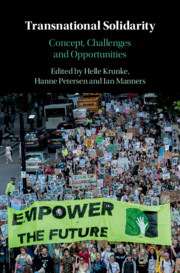Book contents
- Transnational Solidarity
- Transnational Solidarity
- Copyright page
- Contents
- Figures
- Tables
- Preface
- Introduction
- Part I Transnational Solidarity
- Part II Transnational Solidarity in Europe
- Part III (Re)Establishing Transnational Solidarity Within Existing European Institutions and Political Settings
- Part IV Creating New Forms of Transnational Solidarity in Europe
- 14 Free Movement and Social Citizenship
- 15 New Opportunities for Transnational Solidarity Mobilisation
- 16 Changing Normativity and Solidarity
- 17 Transnational Solidarity Among European Cities
- Concluding Thoughts
- Index
17 - Transnational Solidarity Among European Cities
from Part IV - Creating New Forms of Transnational Solidarity in Europe
Published online by Cambridge University Press: 04 July 2020
- Transnational Solidarity
- Transnational Solidarity
- Copyright page
- Contents
- Figures
- Tables
- Preface
- Introduction
- Part I Transnational Solidarity
- Part II Transnational Solidarity in Europe
- Part III (Re)Establishing Transnational Solidarity Within Existing European Institutions and Political Settings
- Part IV Creating New Forms of Transnational Solidarity in Europe
- 14 Free Movement and Social Citizenship
- 15 New Opportunities for Transnational Solidarity Mobilisation
- 16 Changing Normativity and Solidarity
- 17 Transnational Solidarity Among European Cities
- Concluding Thoughts
- Index
Summary
This chapter studies the growing phenomenon of transnational co-operation between and among cities in Europe. This co-operation is driven by other actors than state-level actors, is (or at least claims to be) closer to the citizens, and is based on specific challenges facing cities in different countries. Central to the development is an increased legal and political role for the city transnationally. At a time with multiple challenges to solidarity, the aim is to assess whether co-operation initiatives between and among cities in Europe could be a means through which to create or contribute towards a European transnational solidarity. The focus is on cities within the territorial space of the EU. That being said, the phenomenon of intercity co-operation is by no means confined to Europe (or to the [EU]) and we therefore include prominent global initiatives in which European cities participate at the end of the chapter. The chapter has a special focus on the internal lack of solidarity between cosmopolitan big cities and small towns/rural areas, which seems to be a new trend in many countries, at the same time as we see transnational city solidarity appearing across borders.
Keywords
- Type
- Chapter
- Information
- Transnational SolidarityConcept, Challenges and Opportunities, pp. 393 - 417Publisher: Cambridge University PressPrint publication year: 2020



